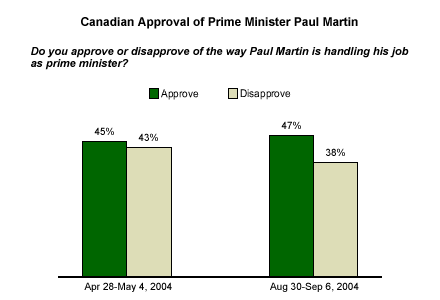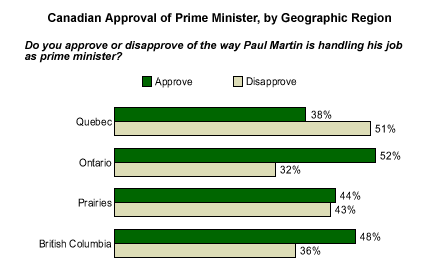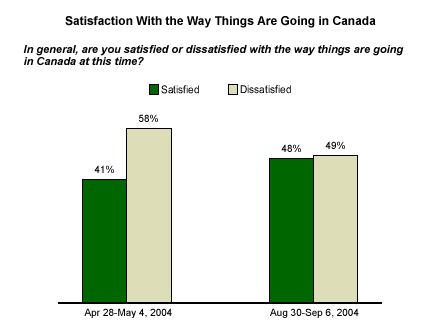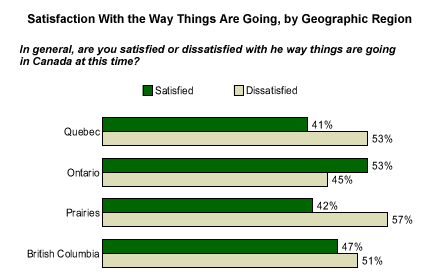Jean Chrétien announced that he would retire from his role as Canadian prime minister in August 2002, after being in power for more than 10 years. Chrétien took his time, however, and didn't step down for another 18 months.
Paul Martin, former finance minister in the Chrétien government, was elected leader of the Liberal Party in November 2003 and took over as prime minister the following month. He subsequently called for a June federal election, possibly believing that an easy victory for his party would cement his role as prime minister. In fact, Martin didn't win the election as easily as predicted, and the Martin Liberals came to power with a minority government, winning 135 of the 308 seats in the House of Commons. (The rival Conservative Party won 99 seats, while the Bloc Quebecois captured 54 and the New Democrats won 19.)
What do Canadians think about their "new" leader? In early May, after Martin took over as Canadian prime minister (but before he called a federal election), almost half of Canadians (45%) approved of how Martin was handling his job and a similar number (43%) disapproved. Results from ┬ÚÂ╣┤ź├ŻAV's most recent poll of Canadians in late August/early September* show little change, although the gap between approval and disapproval has widened slightly. Forty-seven percent approve of the job Martin is doing, compared with 38% who disapprove.

Looking across the country, Martin's approval rating is highest in Ontario (52%) and lowest in Quebec (38%). According to Stephen Clarkson, professor of political economy at University College at the University of Toronto, the low ratings in Quebec can be easily explained by Adscam [a scandal involving $250 million that the federal government spent on advertising between 1997 and 2002 to fight separatism in Quebec]. Low ratings in the West, he says, would be consistent with the Liberals' poor performance historically, as well as Martin having "failed to deliver what he promised in terms of recruiting star businesses and Western candidates to change the profile of his government."

General Mood of Canadians
Canadians are also divided on the more general question of "how things are going" in their country. Almost equal numbers report feeling satisfied (48%) and dissatisfied (49%). These results are more positive than they were in May, when a majority of Canadians (58%) were dissatisfied and 41% were satisfied (see "More Canadians Than Britons Living the Good Life" in Related Items).

As with their approval of the prime minister, Canadians in Ontario are most satisfied with how things are going than those in the rest of Canada. Nelson Wiseman, associate professor in the department of political science at the University of Toronto, says that these results are an example of "a divided country, which was confirmed in the recent election."

Bottom Line
Much like their American neighbors, Canadians offer no decisive mandate on the leadership of their country. Only time will tell if Martin will succeed in keeping a tenuous minority Liberal government in power, and if his reign as prime minister will be as long-lived as that of his predecessor.
*Results in Canada are based on telephone interviews with 1,005 national adults, aged 18 and older, conducted Aug. 30-Sept. 6, 2004. For results based on the total sample of national adults, one can say with 95% confidence that the maximum margin of sampling error is ±3 percentage points. The survey was conducted by ┬ÚÂ╣┤ź├ŻAV Canada.
